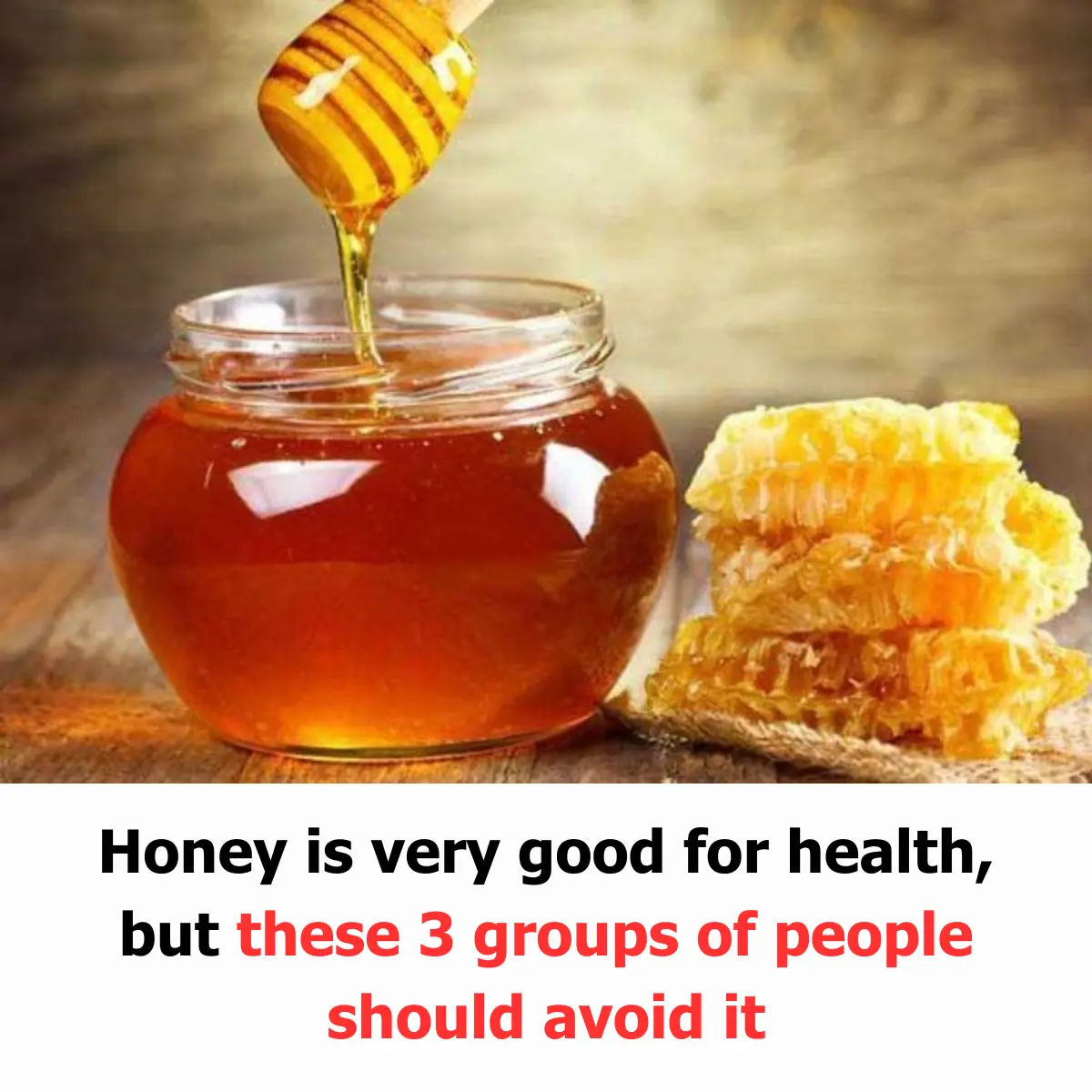
Honey is Very Good for Health, But These 3 Groups of People Should Avoid It
Honey has been celebrated for centuries for its sweet taste and various health benefits. It’s packed with antioxidants, vitamins, and minerals, and its antibacterial properties make it a popular natural remedy for soothing sore throats and improving digestion. However, despite its many health benefits, honey is not suitable for everyone. Certain individuals should exercise caution when consuming honey. In this article, we will explore why honey is beneficial for most people but may not be suitable for three specific groups.
1. People with Honey Allergies
Although rare, some individuals may have an allergy to honey or pollen found in honey. For people with such allergies, consuming honey can lead to allergic reactions, including skin rashes, swelling, difficulty breathing, or even anaphylaxis, a severe life-threatening allergic reaction. If you have a known allergy to bee products or pollen, it’s important to avoid honey and consult a healthcare provider about suitable alternatives to avoid any harmful effects.
2. Infants Under One Year Old
While honey is generally safe for most adults and older children, it should never be given to infants under one year old. Honey may contain spores of Clostridium botulinum, a bacteria that causes botulism, a rare but serious form of food poisoning. In infants under 12 months, the digestive system is still developing, and their bodies are unable to fight off these bacteria effectively. Ingesting honey could result in botulism, which can cause muscle weakness, breathing difficulties, and even death. Therefore, parents should avoid giving honey to babies, and instead opt for age-appropriate foods and drinks.
3. People with Diabetes
While honey contains natural sugars and offers some health benefits, individuals with diabetes need to be cautious about consuming it. Honey, like other sweeteners, has a high glycemic index and can cause a rapid spike in blood sugar levels. This can lead to complications for individuals with diabetes, as managing blood sugar levels is critical to their health. Even though honey may have a slightly lower glycemic index than refined sugar, it can still affect insulin sensitivity and lead to blood sugar imbalances. Diabetics should consult their healthcare provider before including honey in their diet and opt for sugar alternatives if needed.
Conclusion
Honey is undoubtedly a nutritious and natural food, providing a wide range of health benefits when consumed in moderation. However, it is important to recognize that not everyone should incorporate honey into their diet. Individuals with allergies to honey or pollen, infants under one year old, and people with diabetes should avoid honey or consume it with caution. If you belong to one of these groups, it’s always best to seek advice from a healthcare professional before adding honey to your diet. For most people, however, honey can be a sweet and beneficial addition to a balanced diet.
News in the same category


Drinking coffee at certain time of day could reduce your r.i.sk of d.e.a.th and heart disease

The surprising benefits of eating boiled sweet potatoes for breakfast: Unexpected changes in your body

The vegetable that helps reduce sugar in the body - A powerful ally against dia.betes

Your body often warns you long before can.cer advances - but many people miss the signs

If you wake up in the morning and notice these 4 signs — sorry to say, but kidney disease may be silently progressing in your body day by day

Gout is an increasingly common condition among many people. Those with gout should absolutely avoid these foods

Banana Blossom – A Cheap Dish with Benefits That Even Doctors Find Surprising

Frequent Mouth Ulcers in Winter: Don’t Ignore Them, as They May Signal Serious Health Issues

A Serious Reminder: 3 Types of Fruit That Can.cer Cells “Love” — Doctors Avoid Them, Yet Many People Eat Them Daily

A Heart Attack Can Warn You 3 Months Early These 5 Signs Are Often Ignored

Popular low-calorie sweetener linked to liver disease: new study

The “Miracle Food” Against Can.cer and Aging — Surprisingly Found at Every Market

Doctors Warn: If You’re One of These 5 People, Stay Away From Jackfruit

7 Can.cer Warning Signs That Can Appear When You Wake Up

Six Alarming Symptoms That May Indicate Advanced-Stage Can.cer

Doctors Warn: Three Types of People Who Should Never Drink Coffee

One Month Before A Heart At.tack, Your Body Will Warn You Of These 7 Signs

Young and at Risk: Str.ok.e Strikes 19-Year-Old After Headache — 5 Symptoms You Shouldn’t Ignore

20 Early Warning Signs That Can.cer May Be Developing in Your Body
News Post

6 more foods you should not pair with coffee - many people still do

Drinking coffee at certain time of day could reduce your r.i.sk of d.e.a.th and heart disease

The surprising benefits of eating boiled sweet potatoes for breakfast: Unexpected changes in your body

Red Velvet Strawberry Cheesecake

The vegetable that helps reduce sugar in the body - A powerful ally against dia.betes

Never reheat these 5 items in the microwave!

Your body often warns you long before can.cer advances - but many people miss the signs

Pineapple Glazed Braised Pork (or Beef)

How long should frozen meat last before it should be discarded?

How to Fix a Weak Toilet Flush at Home - No Technician Needed

If you wake up in the morning and notice these 4 signs — sorry to say, but kidney disease may be silently progressing in your body day by day

Gout is an increasingly common condition among many people. Those with gout should absolutely avoid these foods

Banana Blossom – A Cheap Dish with Benefits That Even Doctors Find Surprising

Frequent Mouth Ulcers in Winter: Don’t Ignore Them, as They May Signal Serious Health Issues

A Serious Reminder: 3 Types of Fruit That Can.cer Cells “Love” — Doctors Avoid Them, Yet Many People Eat Them Daily

Here are some possible reasons you might be getting these bruises

A Heart Attack Can Warn You 3 Months Early These 5 Signs Are Often Ignored

Popular low-calorie sweetener linked to liver disease: new study

The “Miracle Food” Against Can.cer and Aging — Surprisingly Found at Every Market
